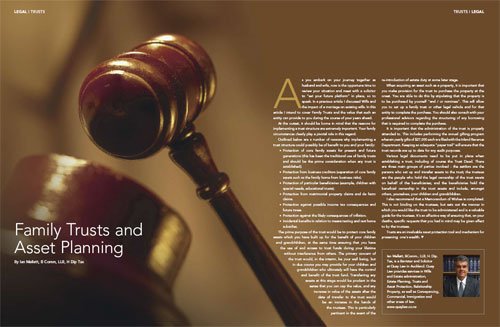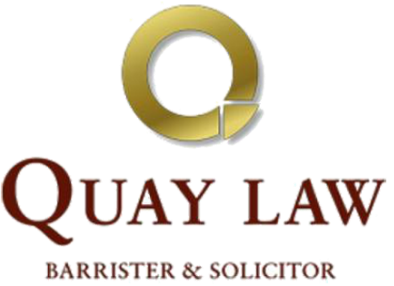Family Trusts and Asset Planning
Two Articles on Family Trusts (1. Family Trusts and Asset Planning and 2. New Zealand Trust and Gifting Law under Review including our YOU TUBE presentation)
1 October 2009
Legal article by Ian Mellet (Auckland lawyer and principal of Quay Law NZ Barrister and Solicitor)
As you embark on your journey together as husband and wife, now is the opportune time to review your situation and meet with a solicitor, to “set your future platform” in place so to speak. In a previous article I discussed Wills and the impact of a marriage on existing wills. In this article I intend to cover Family Trusts and the value that such an entity can provide to you during the course of your years ahead.
At the outset, it should be borne in mind that the reasons for implementing a trust structure are extremely important. Your family circumstances clearly play a pivotal role in this regard.
Outlined below are a number of reasons why implementing a trust structure could possibly be of benefit to you and your family:
Protection of core family assets for present and future generations (this has been the traditional use of family trusts and should be the prime consideration when any trust is established).
Protection from business creditors (separation of core family assets such as the family home from business risks).
- Protection of particular beneficiaries (example, children with special needs, educational trusts).
- Protection from matrimonial property claims and de facto claims.
- Protection against possible income tax consequences and future taxes.
- Protection against the likely consequences of inflation.
- Incidental benefits in relation to means testing and rest home subsidies.
Background
The prime purpose of the trust would be to protect core family assets which you have built up for the benefit of your children and grandchildren, but at the same time ensuring that you have the use and access to trust funds during your lifetime without interference from others. The primary concern of the trust would, in the interim, be your well being, but in due course you may provide for your children and grandchildren who ultimately will have the control and benefit of the trust fund. Transferring any assets at this stage would be prudent in the sense that you can cap the value, and any increase in value of the assets after the date of transfer to the trust would be an increase in the hands of the trustees. This is particularly pertinent in the event of the re-introduction of estate duty at some later stage.
When acquiring an asset such as a property, it is important that you make provision for the trust to purchase the property at the onset. You are able to do this by stipulating that the property is to be purchased by yourself “and / or nominee” This will allow you to set up a family trust or other legal vehicle and for that entity to complete the purchase. You should also consult with your professional advisors regarding the structuring of any borrowing that is required.
It is important that the administration of the trust is properly attended to. This includes performing the annual gifting programme wherein yearly gifts of $27,000 each are filed with the Inland Revenue Department. Keeping an adequate “paper trail” will ensure that the trust records are up to date for any audit purposes.
Legal documents
Various legal documents need to be put in place when establishing a trust, including of course the Trust Deed. There are three main groups of parties involved. The Settlors are the persons who set up and transfer assets to the trust. The Trustees are the people who hold the legal ownership of the trust assets on behalf of the beneficiaries. The Beneficiaries hold the beneficial ownership in the trust assets and include, amongst others, yourselves, your children and grandchildren.
I also recommend that a Memorandum of Wishes is completed. This is not binding on the trustees, but sets out the manner in which you would like the trust to be administered and is a valuable guide for the trustees. It is an effective way of ensuring that on your deaths specific requests that you had in mind may be given effect to by the trustees.
Trusts are an invaluable asset protection tool and mechanism for preserving one’s weath.
Please contact Ian Mellett at Quay Law for more information, or if you have any further questions on Family Trusts and Asset Planning.
Ian Mellett BComm LLB H Dip Tax is a Barrister and Solicitor at Quay Law in Remuera, Auckland. This Auckland law firm provides services in Wills and Estate administration, Estate Planning, Family Trusts and Asset Protection, Relationship Property Agreements, as well as Conveyancing, Commercial, NZ Immigration and other areas of law. Phone number (09) 523-2408.
NEW ZEALAND LEGAL ARTICLE 2 :
22 March 2011
New Zealand Trust Law under review by Ian Mellett of Quay Law, Auckland, NZ
Based on current records, New Zealand has one of the highest numbers of trusts per head of population in comparison to other countries. It is estimated that there are at least 237,500 trusts in New Zealand but this figure could be as high as 400,000.
The Law Commission has been asked to review the Trustee Act 1956 and trust law generally. The Commission plans to tackle the review in 3 stages:
- Stage 1 will look at the Trustee Act 1956, the Perpetuities Act 1964 and trust law generally. The first paper was released in November 2010 and focused on the history of trusts. The second paper was released in December 2010 and focused on the uses of family trusts in New Zealand. This paper included the potential concerns surrounding the current use of trusts.
- Stage 2 will consider the Charitable Trusts Act 1957.
- Stage 3 will consider the trustee companies legislation.
There is an intention to abolish gift duty with effect from 1 October 2011. Whilst this legislation is yet to be passed, it seems that from this date gift duty will no longer be a relevant factor for people settling trusts. The result of this proposed legislation will be an easier movement / transfer of assets into trusts.

So where does this leave Trusts as we focus on 2011?
The proposed abolition of gift duty together with major changes to the qualifying companies regime and the Law Commission’s re-examination of trust law means this will be a momentous year for those with trusts.
Of current concern to the Law Commission is the transferring of assets into trusts to avoid obligations to, for example, creditors and / or spouses or partners under the Relationships (Property) Act 1976. The Law Commission is considering whether:
- legislation should address the need to look through trusts in certain circumstances in order that trust property can be made available to a creditor, spouse or partner or for government asset testing.
- legislation should address sham trusts and the problem of trusts that are not really trusts.
With specific reference to treating trusts as “look through” entities, the Law Commission is evaluating if it should allow trust assets to be made available to creditors, spouses and partners, and to be considered as a part of the assets of the settler or a person with control over the trust for assessing eligibility for government assistance. As an alternative, the law could continue to leave it to individual statutes to address how a disposition of property or income to a trust is to be treated in a context where such a disposition defeats a government policy. Because of the difficulties in creating look-through provisions that meet the needs of the various contexts to which they must be applied, the latter may be the preferred approach.
As a result of the relevant legislation being reviewed, and regardless of the outcome of the proposed law changes, now is the time for New Zealanders to review their trusts.
Relevant considerations during such a trust review might include:
- The intentions of the settlor in establishing the trust;
- The intentions of the trustees;
- Whether the trustees were indifferent as to whether a valid trust was intended to be established;
- How the affairs of the trust have been conducted;
- Whether property of the settlor has been intermingled with trust property;
- Whether the settlor has treated trust property as his or her own;
- The degree of control exercised by the settlor over the affairs of the trust;
- Whether the trustees have acted independently of the settlor in carrying out their duties;
- The real nature of the arrangement irrespective of how it is described;
- The implications of the repeal of gift duty, which may exacerbate some of the problems associated with trust use and may reduce the effectiveness of the existing legislative approaches to trusts
Whilst the review of trust law is in progress and the Law Commission invites comments, it is recommended that you consult a family trust specialist in order to discuss these proposed law changes and their impact on your existing or proposed trust. A focus for this discussion could be:-
- The role of the independent trustee.
- Ongoing trust administration and reporting.
- Separation of trust affairs from personal affairs.
If you have any further questions regarding your current or proposed Family trusts, please do not hesitate to contact me. My name is Ian Mellett and I am the principal of Auckland Law firm, Quay Law NZ. My contact details are (09) 5232408. Quay Law’s offices are located on Remuera Road in Remuera.
Contact Auckland law firm Quay Law.
QUAY LAW PRESENTATION ON FAMILY TRUST | FAMILY TRUSTS ON YOUTUBE. This slideshow was put together by Auckland lawyer – Ian Mellett.
Recent News
Our legal tips are provided by the Auckland lawyers and conveyancing specialists at Quay Law (New Zealand). These articles cover a range of legal topics and news worthy articles.
- Why Insurance Matters in New Zealand Property Deals
• Banks usually won’t lend until you can insure the property. • Insurance covers catastrophic events—fires, floods, earthquakes. • If you can’t insure, you can’t settle. You could lose your deposit. Imagine signing and going unconditional. Then paying a big deposit, only to discover […]
- The Hidden Dangers of Unconsented Works When Buying or Selling a House in NZ
Introduction: Picture this: You’ve found the perfect house, the one that ticks all the boxes – the dream home you’ve been searching for. But wait! Before you get carried away with visions of cozy nights by the fireplace, there’s something you need to know. Unconsented works can turn your […]
- Tony Alexander: FOMO’s back – why Auckland is primed to lead the next house price surge
Original Source – ONEROOF.CO.NZ – 19 July 2023 Article repurposed for our blog. ANALYSIS: Each month, I / Tony Alexander conduct five surveys among my 31,000 subscribers of ONEROOF to gain firsthand insights into the economy, particularly the housing market. This week, I ran a survey […]




